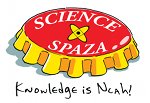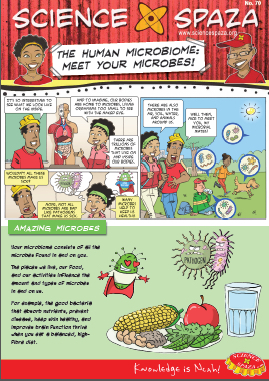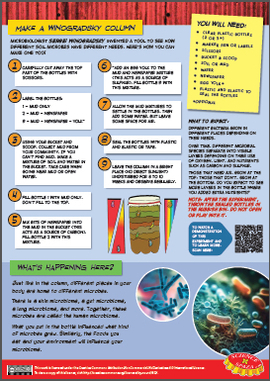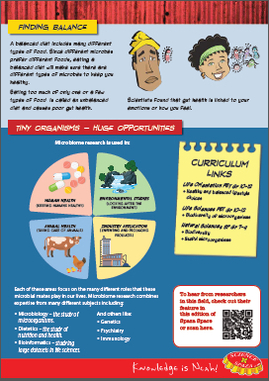Meet your Microbes!
Download the worksheet here: Science_Spaza_Worksheet_No_70_Gut_Microbiome_WEB.pdf
Download this page with interviews here: ScienceSpaza_SUN_NSW2024.pdf
Watch a cool science experiment here!

Watch the interview with Dr Charissa Naidoo here:

Watch the interview with Dr Rachiel Gumbo here:

Watch the interview with Lauren Martin here:

World Migratory Bird Day 2024
For World Migratory Bird Day, 11 May 2024, we caught up with a long time friend of Science Spaza and the coolest BIRD RESEARCHER, Dr Thobeka Gumede.
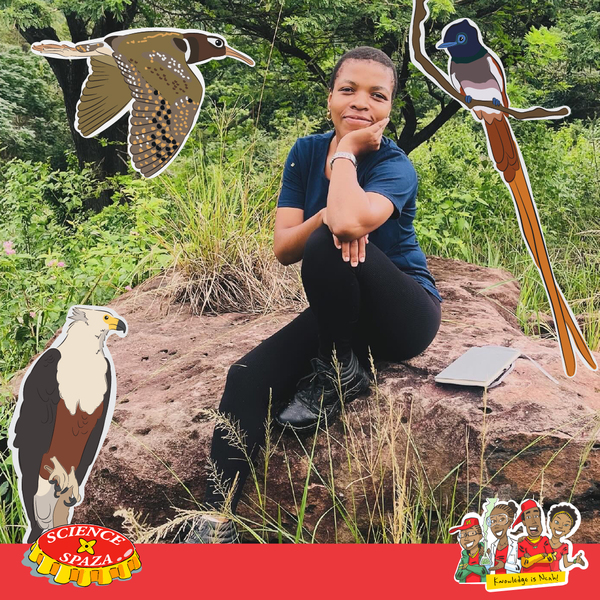
How did you get interested in researching birds?
My interest in researching birds began at a young age when I spent a lot of time outdoors with my family. I vividly remember birdwatching with my friends, where we'd try to spot different species on our way to school. These experiences sparked my curiosity about the natural world, and I found myself drawn to birds in particular because of their beauty and diversity.
As I grew older, my fascination with birds deepened, and I began to actively seek out opportunities to learn more about them. I enrolled in courses on ecology, where I gained a deeper understanding of bird biology, behaviour, and their role in conservation.
Contributing to data collection efforts and collaborating with other bird enthusiasts allowed me to make meaningful contributions to scientific research while also deepening my own knowledge and appreciation for these remarkable creatures.
Overall, my journey into researching birds has been driven by a combination of childhood experiences, academic curiosity, and a desire to contribute to our understanding of the natural world.
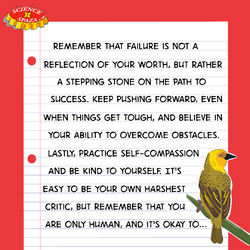 |
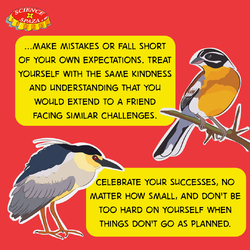 |
What helped you believe in yourself, to pursue your dream/ career?
Believing in myself and pursuing my dreams and career involved a combination of factors and experiences.
Firstly, having a supportive family and mentors played a crucial role. Their encouragement, guidance, and belief in my abilities gave me the confidence to pursue my goals, even when faced with challenges or setbacks.
Additionally, cultivating a growth mindset was instrumental. Embracing the idea that failure is a natural part of the learning process and an opportunity for growth helped me persevere during difficult times. Instead of seeing obstacles as insurmountable barriers, I learned to view them as opportunities to learn, adapt, and become stronger.
Setting clear goals and developing a plan to achieve them also played a significant role in building my self-belief. Breaking down larger aspirations into smaller, manageable steps allowed me to make progress incrementally, which in turn boosted my confidence and motivation.
Finally, staying true to my passions and interests fueled my determination to pursue my dreams. Being deeply passionate about my chosen path gave me the drive and resilience needed to overcome obstacles and stay focused on my long-term goals.
While self-belief and pursuing one's dreams can be challenging at times, surrounding oneself with support, embracing failure as part of the journey, setting clear goals, and staying true to one's passions can all contribute to building the confidence needed to pursue a fulfilling career or dream.
What advice would you like to give your much younger self that would help you achieve your dreams?
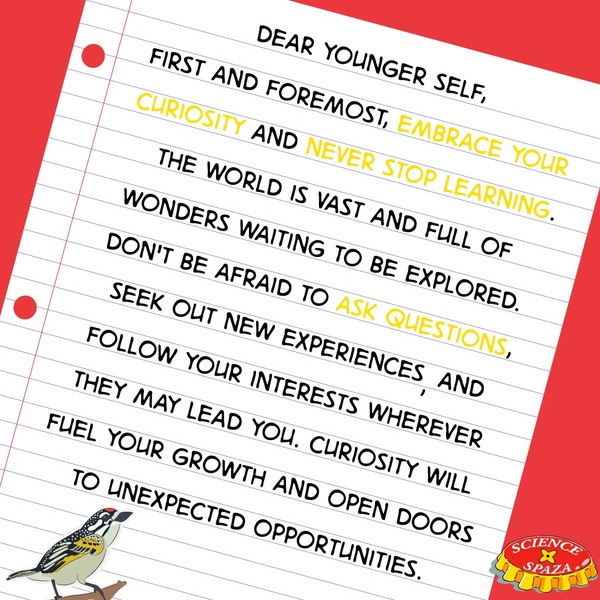
Dear younger self,
First and foremost, embrace your curiosity and never stop learning. The world is vast and full of wonders waiting to be explored. Don't be afraid to ask questions, seek out new experiences, and follow your interests wherever they may lead you. Curiosity will fuel your growth and open doors to unexpected opportunities.
Secondly, cultivate resilience in the face of challenges. Life is filled with ups and downs, and setbacks are inevitable. Instead of letting them discourage you, view them as opportunities for growth and learning. Remember that failure is not a reflection of your worth, but rather a stepping stone on the path to success. Keep pushing forward, even when things get tough, and believe in your ability to overcome obstacles. Lastly, practice self-compassion and be kind to yourself.
It's easy to be your own harshest critic, but remember that you are only human, and it's okay to make mistakes or fall short of your own expectations. Treat yourself with the same kindness and understanding that you would extend to a friend facing similar challenges. Celebrate your successes, no matter how small, and don't be too hard on yourself when things don't go as planned.
By embracing curiosity, resilience, and self-compassion, you'll not only achieve your dreams but also find joy and fulfillment along the way. With love and encouragement,
Your future self
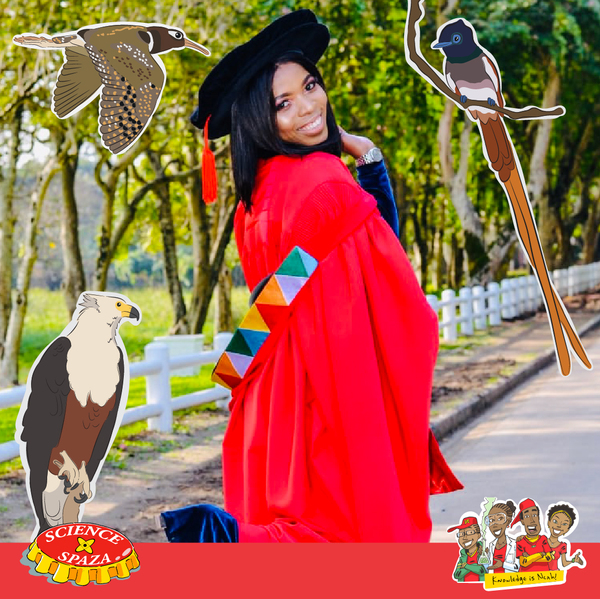
Meet Soyama Sivatho Nyangwa from Stellenbosch University's Division of Molecular Biology and Human Genetics
Tell us about yourself and what obstacles you had to overcome to get where you are today?
I was born in the Eastern Cape, in a small town called Keiskammahoek, and am the youngest of 6 children. For as long as I can remember, I wanted to become a doctor or scientist. Coming from a previously disadvantaged background, growing up was not easy. My parents worked hard to provide my siblings and I with the best opportunities to enable us to pursue our dreams. During my training as an iGqirha (Traditional Healer), I faced many personal challenges which shaped me and added to my passion for wanting to solve the world's problems – especially in relation to health and diseases. This fueled my interest in science, as it made me want to find the link between traditional medicine and modern medicine as we know it today. The most recent challenge I faced was the loss of my grandmother, who was one of my biggest motivators. This was a very difficult time for me, but my determination to achieve my goals, which I believe represent our ancestor’s wildest dreams as they fought for freedom and equality, was what helped me through this time. It is important not to let setbacks such as this, which you have no control over, hold you back from accomplishing your dreams.
Why did you choose your field of study – what or who inspired you?
My motivation to pursue a science career was inspired by my mother’s passion for nursing. Being a professional nurse, her work introduced me to the field of medicine. I still remember watching her study and going through the pictures in her Anatomy and Physiology textbooks. I was fascinated and wanted to understand what was going on. As I got older and started studying science, my love for medicine grew into a passion for medical research. Research allows us to answer important medical questions. I began my science journey pursuing a diploma in Biotechnology at Cape Peninsula University of Technology and then a BTech degree in Biomedical Technology. After my studies, I worked in the wine and cosmetics industry, but still had a thirst for knowledge. This prompted me to further my scientific studies and I joined the Division of Molecular Biology and Human Genetics at Stellenbosch University where I am currently conducting TB Research for my PhD.
What advice do you have for young people who are considering a career in STEM?
Science is a passion. If you see becoming a scientist as simply a job to make money and not something you are truly excited about, then maybe it isn’t the career you are destined for. Why? Because science is never easy. To sum it all up: work hard, play hard, ground yourself in something you love doing and don’t forget to pray!
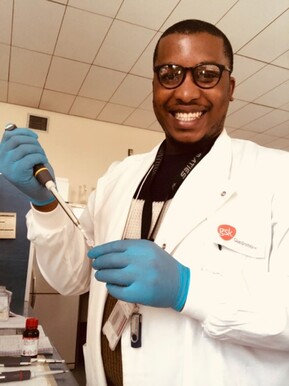
This content was created in partnership with Stellenbosch University.

Interview with Christina Meiring from Stellenbosch University's Division of Molecular Biology and Human Genetics
Why did you choose your field of study – what or who inspired you?
I have always had an interest in biology, genetics, wildlife and conservation. I grew up on a farm and was exposed to many wildlife species in different habitats. I have also always been fascinated with genetic research. When I discovered that Stellenbosch University offered a program where I could combine my interests, I knew that this would be a great journey. It’s important to know that you don’t have to know what type of scientist you want to become at eighteen years old and that there is time to figure it out. The great thing about starting with a Bachelors in Science (BSc) degree is that it’s very broad and you are exposed to so many different aspects of science. You will be able to discover your interest over time which will lead you to a specific scientific passion.
What is your research focus on?
Wild dogs are an endangered species, with only 6600 wild dogs left in the wild. They face many challenges, such as environmental changes, hunting by humans and diseases. This puts the population under pressure. In order to survive, wild dogs need help from veterinarians and conservationists to adapt to changing environments and become resistant to disease. However, not enough is known about wild dog genetics to make the best decisions that will help them; and this is where I come in. My research involves getting detailed information about genetic differences in wild dogs using whole-genome sequencing (WGS). This can tell us how similar or different their DNA is by comparing the genetic code and looking for similarities and differences. We are also investigating whether some genes within the wild dogs make them vulnerable to infection by the bacteria (Mycobacterium bovis) which causes animal TB. Animal TB can be deadly for these endangered wild dogs.
How can your research help to improve Africa and/or the lives of its people?
This research will be used to improve conservation strategies which will ultimately ensure the survival of wild dogs in the future. Wild dogs play a very important role in the ecosystem as predators, and their survival is very important for habitat biodiversity. It is very exciting and satisfying that my work can contribute to something as important as the conservation of an endangered species. In the future, I hope to research the genetics of many endangered species, allowing conservationists to make informed decisions and protect our wildlife.
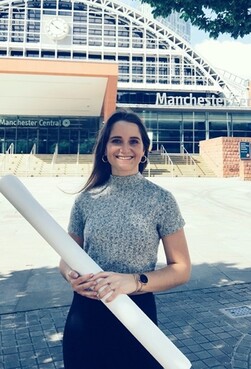
This content was created in partnership with Stellenbosch University.

About the Division of Molecular Biology and Human Genetics
The Division of Molecular Biology and Human Genetics (MBHG) at Stellenbosch University (SU) is a state-of-the-art research facility focusing on the study of tuberculosis (TB). Tuberculosis is an airborne disease that infects the lungs and is spread when a person who is sick with TB coughs, sneezes, sings or talks. Each year, about 10 million people become infected with TB and over 1 million people die because of the disease.
Tuberculosis is a curable disease, which can be beaten if you go to the doctor and get your TB treatment. This treatment involves taking medication for 6 months – it is very important that you do not skip taking your medication or you will not be cured and can develop a stronger form of TB, which can’t be treated (or is resistant to) the normal medication. This is known as antibiotic/drug resistant TB, which requires more TB drugs for a much longer in order to be cured. Scientists from MBHG study TB disease in both humans and animals to increase understanding of the disease, as well as create new tools and medicines that can be used to fight TB. Some of the things they look at are: how the body works to fight off the infection; finding better and faster ways to test for TB in humans and animals; discovering and developing new TB medicine to improve TB treatment and stop/prevent drug resistance (resistance to the normal TB medicine used to cure patients); and studying how the TB is spread to improve TB control and prevention methods. These scientists come from a variety of backgrounds. Some studied science degrees at university, focusing on subjects like microbiology, biochemistry, physiology or chemistry. Others studied engineering and wanted to use their skills in medicine, so they teamed up with clinical scientists to create new technologies for healthcare. Interestingly, some of MBHG’s scientists are actually medical doctors and veterinarians (animal doctors), who wanted to learn more about how research can help improve medical care in South Africa. Check out these interviews with researchers from MBHG who are currently working on different projects related to TB.
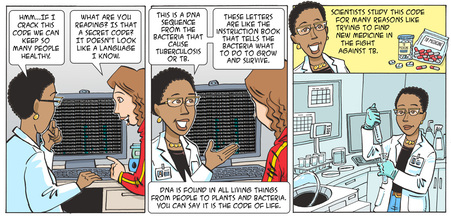
Interview with Miss Loren Rockman, a Masters candidate at SU MBHG
What is your research focus on?
My research focuses on finding better ways to diagnose Tuberculosis (TB) in humans. The most common methods use genetics to check whether the bacteria that causes TB is present in the lungs. It does this by looking for the bacteria’s DNA in sputum. Sputum is a mixture of saliva and mucous that is coughed up from the respiratory tract. If the bacteria’s DNA is found in the persons sputum - it is a positive result indicating they have TB. In addition to simply finding the bacteria’s DNA, this test, called Ultra, uses genetic sequencing to determine whether the person has drug-susceptible or drug resistant TB. This is very important when deciding which medicine the person needs to take to be cured. Some people, especially younger children, have trouble coughing up sputum. This is a problem because without this sample, the clinic cannot perform the right tests to make sure they give the correct treatment. My research is looking at ways to use different samples, like a tongue swab or oral wash, that are easier to collect to test for TB. This will help put these people on the right treatment faster so that they are cured quicker and do not spread the disease to others.
Why did you choose your field of study – what or who inspired you?
In January 2017, I was diagnosed with TB. Fortunately for me it was drug susceptible, and I was cured after taking my TB medicine for 6 months. This was a life changing experience for me. I had to adapt to a different lifestyle and put my health first at all times. I travelled to the university via public transport at the time and I remember the one thing that kept me going was my mother by my side every day helping me carry my books (as I was not strong enough to do this by myself ) and assuring me that this too shall pass and that I needed to keep the end goal in mind. It taught me to be patient with myself and to always remain positive. It also gives me great honour to say that I am a TB survivor. Having battled TB helps me relate to what other TB patients are going through and is the source of my passion for which I believe has brought me to where I am today.
What advice do you have for young people who are considering a career in STEM?
It is important to be 100% certain that this is the career you want for yourself and that you are passionate about it. A career in STEM should come from the heart as you will always put in your best. Sometimes there will be failures, but failures are not setbacks, they are simply steppingstones to a second opportunity where you can improve on what you have done the first time. The challenges will always be there, but if your heart is in the right place, you will always find a reason to carry on.
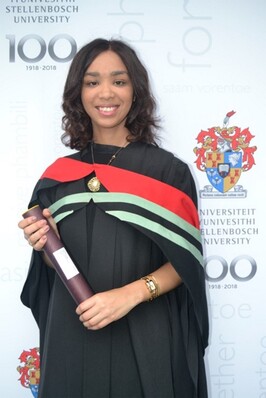
This content was created in partnership with Stellenbosch University.

